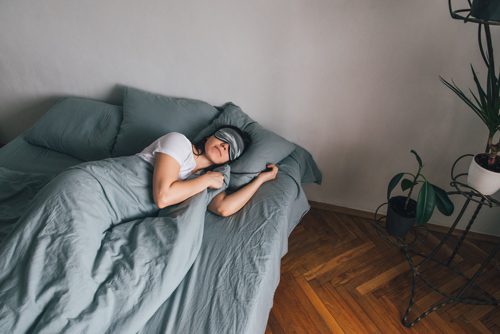 We hear it all the time: rest is good for us! Yet how much effort do we really put into developing good sleep habits? Proper rest not only helps us manage stress more effectively, but also influences our overall health. If you’re trying to make recovery easier, the answer might be more pillow time.
We hear it all the time: rest is good for us! Yet how much effort do we really put into developing good sleep habits? Proper rest not only helps us manage stress more effectively, but also influences our overall health. If you’re trying to make recovery easier, the answer might be more pillow time.
Trouble in Dreamland
Most of us need more sleep than what we usually get. No surprise, right? Sleep Advisor shares some other interesting slumber facts and stats.
- Approximately 40 percent of adults between the ages of 40–59, and 37 percent of people 20–39, get less than the recommended 7–9 hours of sleep each night. Some people might actually feel better if they sleep for 10–11 hours each night!
- The most common sleep disorder is insomnia—30 percent of adults experience it regularly; 10 percent of people have chronic insomnia; and between 25–75 percent of people in addiction recovery experience insomnia for up to two years after treatment.
- About 40 percent of people with insomnia also have a co-occurring mental health condition, and 75–90 percent have medical disorders such as pain.
- Falling asleep quickly isn’t necessarily a good thing. It should take about 10–15 minutes to nod off—if you’re out as soon as your eyes close, this is a symptom of sleep deprivation.
- Roughly 50 percent of people snore, which sometimes interferes with the sound sleep of their partners.
- Humans are the only mammals who purposely deprive themselves of sleep.
- Your sleep habits can even affect your weight. Up to 5 percent of adult obesity might be due to fewer hours of sleep.
- A person’s body never fully adjusts to shift work, according to the Sleep Foundation, and these employees have a tendency to experience more cardiovascular and gastrointestinal diseases.
- In the U.S., drowsy driving causes up to 40,000 injuries and 1,500 fatalities each year.
These are only the percentages currently known about sleep issues—an “estimated 10 million people in the U.S. remain undiagnosed.”
How Good Sleep Habits Improve Your Health
The Sleep Association outlines some of the primary reasons proper rest is vital to your health:
- It improves the immune system and regulates your body’s ability to defend against disease.
- It enhances how your nervous system functions, which is essential for reducing stress, helping boost or repair neurological activity, and sending signals to other areas of the body.
- It stimulates growth hormones in children, and promotes better emotional and mental processing in adults.
A good night’s sleep affects everything from your reaction time, productivity, and learning abilities to how much you eat, the way you relate to others, and what you can remember.
Ways to Improve Your Sleep Hygiene
Most of the time, once you create a routine for good sleep hygiene, it takes about 30–60 days to feel the results. The first week or so of adjusting your sleep habits might be a bit rough, but stick with it! Keeping a sleep diary might help.
- Follow a similar sleep/wake cycle, even on off-days. This is probably the hardest habit to create, because who doesn’t like to stay up late or sleep in when there’s not a work schedule to follow? But a consistent wake-up and bedtime routine helps orient your natural circadian rhythms. Use the Sleep Foundation’s bedtime calculator to see how to set your schedule.
- Exercise at least five days a week, especially in the moderate-to-vigorous zone. Just make sure not to work out an hour before bedtime or lose sleep to fit it into your morning.
- Make a sleep haven. This includes a room temperature of 60–67 degrees; comfortable mattress, pillows, and linens; less clutter; and no extra lights. Some people even use darkening shades, ear plugs, and eye masks to enhance the cozy.
- Eliminate distractions and electronics. You should not, under any circumstances, go to bed with the TV on! Even though some people find a familiar show or simply the background noise comforting, the blue light emissions will disrupt your sleep cycle over time. The same goes for scrolling social media or going down internet rabbit holes on your phone or tablet. Shut off all electronics at least 30 minutes before bedtime. If you really need sound to help you drift off, consider a sleep meditation or a sound machine.
- Create a short “time to go to bed” ritual. This might involve reading a non-electronic book or magazine, journaling, meditation or another calming activity, an inspirational podcast, a spiritual check-in or gratitude list for the day—whatever prompts your brain to know it’s time to wind down and prepare for sleep.
- Avoid heavy meals and cigarettes before bedtime. Allow for two-to-three hours to digest before heading off to bed. And since nicotine is a stimulant, taking one last puff prior to nodding off makes it more challenging to rest comfortably, so don’t smoke at least an hour before moving into your quiet time.
There are pros and cons to sleep aids. If you’re in recovery, these might not be a good option, as some people become psychologically or physically dependent on them. If you really need additional help falling or staying asleep, talk with a qualified health professional about more natural, non-addictive options.
Always Willing to Make Your Life Better
We research subjects like this and other blog topics to provide you with as much information as possible to make progressive health choices. It’s one part of our commitment to continuing care because you deserve the best life. Please comment below if there are any other topics you’d like us to cover.



